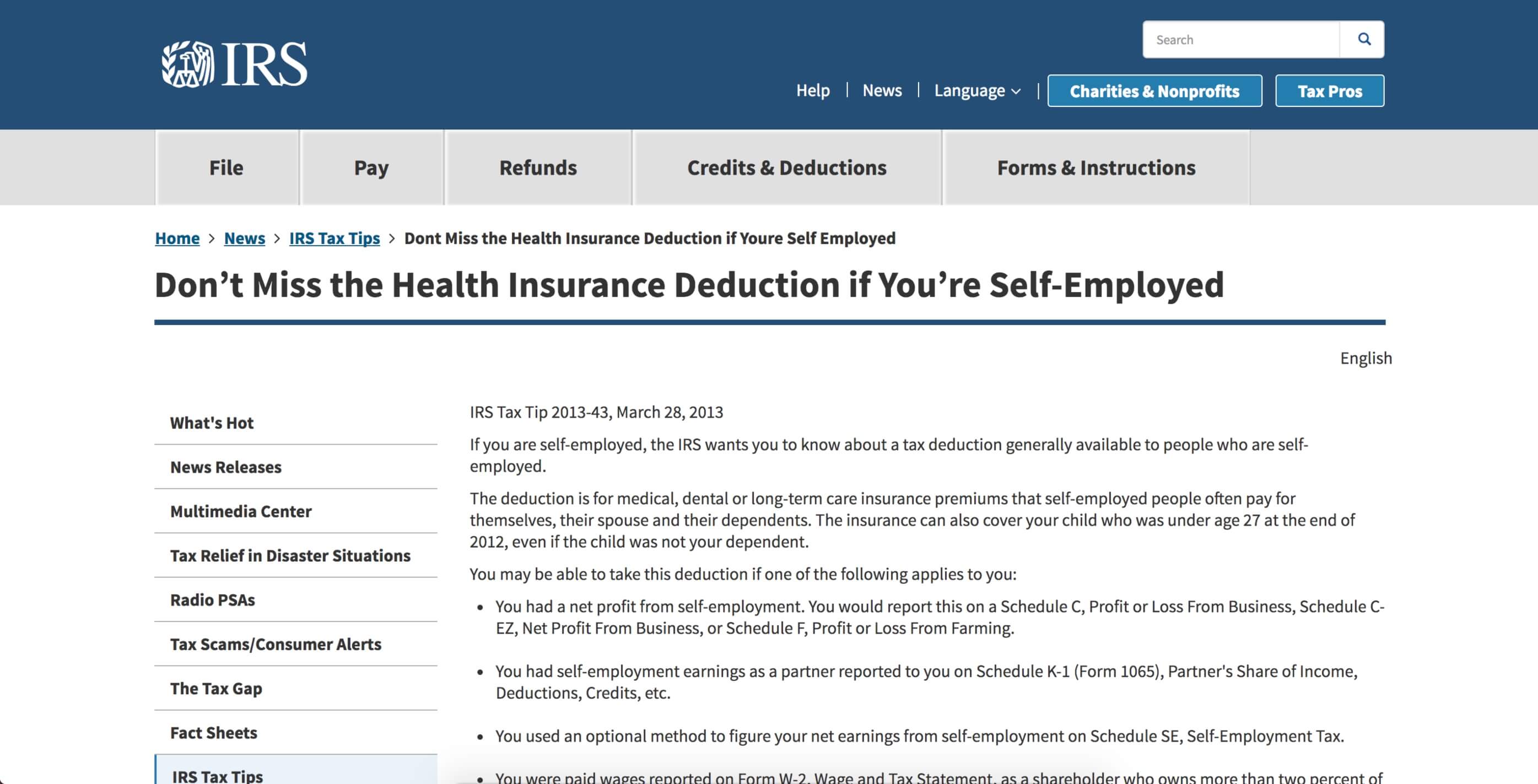In a similar way to contract templates, health insurance can be messy, especially for a freelancer. When you’re tasked with researching, comparing, and buying your policy all on your own, it may feel like a completely overwhelming process. Even with the ever-changing news cycle, and all of the changes freelancers are facing with today’s health market, there are some good things happening with health care for freelancers. One of them is the self-employed health insurance deduction! Here’s everything you need to know about qualifying for and claiming this very valuable deduction.
Note: If you want to claim the self-employed health deduction as well as maximize your tax savings, try Bonsai Tax. Our app scans all your bank/credit card receipts to discover tax-write offs. Users typically save $5,600. Try a 7-day free trial today and see how much you'll save.
How to Claim the Deduction
This is a very straight-forward item to claim on your federal income taxes. According to the IRS, you can take this deduction for medical, dental or long-term care insurance premiums that self-employed people purchase for themselves and their families (including children who attend college up to certain age and dependents who aren’t your own children.) This is also one of the largest deductions you can take in a given year, with 100% of the cost of premiums being deductible.

Note that this is a special perk for freelancers that is not the same as a typical business deduction. This special personal deduction doesn’t count against your self-employment taxes, but rather your federal, states, and local income taxes. Claiming it can significantly decrease the amount of personal income tax owed, and can help you owe less at the end of the year – or even increase a refund!
You will be taking this deduction on your 1040, not your schedule C, so look for questions regarding how much you paid in health insurance premiums during the year. It’s a good idea to keep bank or credit card statements to get the exact amount you paid out. (All of the popular tax filing software and online programs include questions to help you determine if you can take this deduction, and they will put the correct info on the right form to help you claim it.)

Who is Eligible?
Because this is a special deduction for business owners, you cannot take it if you have access to a health insurance plan with your employer. This is important to know, because many freelancers also have regular jobs with a traditional employee arrangement and the ability to purchase benefits. You also can’t take the deduction if you have access to a health plan through your spouse’s employer.
If your business is just starting, or a hobby, and you haven’t made enough money to claim a profit for the year, you cannot claim this deduction. If you make even just a little bit of profit, however, you can claim as much as you made for the year (just not more.) You need to claim the deduction for the business that you designate as the health insurance plan sponsor.
(This means that you can’t combine use profit from one business to take the deduction for another. You can, however, designate one business as a plan sponsor for dental insurance, and another for medical, making it easier to take the entire deduction from businesses who aren’t profiting so well.)
One other important thing to note is that COBRA (Consolidated Omnibus Budget Reconciliation Act) plans are treated differently. This insurance is provided to many workers who leave their jobs but still have access to benefits. The premiums you pay aren’t eligible for this deduction, even though you pay it out of pocket. Because your former employer is still considered the plan sponsor (and not you), it is categorized as an employer health plan.
Where to Find Health Insurance for Freelancer
Now that you know the financial and tax benefits of claiming a self-employed health insurance deduction for your freelance business, it’s wise to pick a plan that covers your needs well. With the ACA (Affordable Care Act) set to make changes in the near future, not everything you see on the current healthcare.gov site will be a permanent offering. In fact, coverage plans will likely change from this year to the next, and people residing in different states (and even counties!) will have completely different coverage options.
If you’ve taken a look at the HealthCare.gov site during open enrollment and see something you like, now is the time to enroll. Open enrollment only lasts from November 1st through December 15th, 2017. (If you need to enroll outside of the dates, you’ll have to wait until the next open enrollment period. Exceptions can be made in the instance of a change in life event, such as marriage, birth, or change in income.)
You can also choose to find healthcare from a marketplace like ehealthinsurance.com or a licensed agent. They can show you a number of options, including those listed on the ACA, as well as short-term plans. Short-term plans do not meet the requirements of the ACA, and so you may be subject to paying a fine by using one. However, many freelancers find that the plans are cheap enough that they save money over buying an ACA plan, especially if they do not qualify for a subsidy. If you are in good health and qualify for a short-term plan, you can generally pay less per month and get lower deductibles and premiums.
(Note: Short-term plans are only good for 3 months, so you will have to renew your plan at the end of each term. Short-term plans do not cover pre-existing conditions, and those with certain health conditions will not qualify. Your deductibles will also start over with each plan.
Short-term plans can be a good option for those in good health who do not want or need the comprehensive plans offered by the ACA and can afford to pay for tax penalties. If your state didn’t expand Medicaid, you may also find short-term plans as your only affordable option.)
Finally, you may qualify for Medicaid through your state, depending on your age, health and income status. Check with your state Health and Human Services office for details and an application.
Should You Have Health Insurance?
This is a question that only you can answer, but for most people, health insurance can offer the freedom and flexibility to get problems taken care of while they are still in a preventative phase and before they become costlier. Freelancers do not have the benefit of paid vacation, sick days, or flex time, so it is extremely important that they stay in good health. It may also be a good idea to invest in disability insurance and life insurance to cover the unexpected.
It’s also important to remember that self-employment health insurance comes in a variety of coverage amounts. If you don’t foresee needing much care, you can always opt for a plan with a higher deductible and co-pay in exchange for a lower premium. Many freelancers who are in good health do fine with what experts call a “catastrophic plan.” These plans cover three office visits a year without having to pay the deductible. The government requires plan purchases to be under 30 or qualify by claiming an economic hardship, however.
Things to Consider During Tax Time
Many people who find health insurance slightly unaffordable can justify the price when factoring in the tax savings. The self-employed health insurance deduction can take hundreds of even thousands off of your tax bill, making it a good investment for many. If you are on the fence and trying to decide between a plan that covers more but that costs more, too, see if you the tax savings might make it worth the higher price.
Freelancers generally have more obstacles than those getting benefits through an employer, so this one tax perk is very popular among independent contractors. With sole proprietors paying more social security and disability tax, it’s also a nice way to make up for the responsibility freelancers have to cover both the employer and employee payroll tax burdens. In some cases, it more than makes up for the added tax liability!
Sign up for a free Bonsai trial and manage your freelance business.






